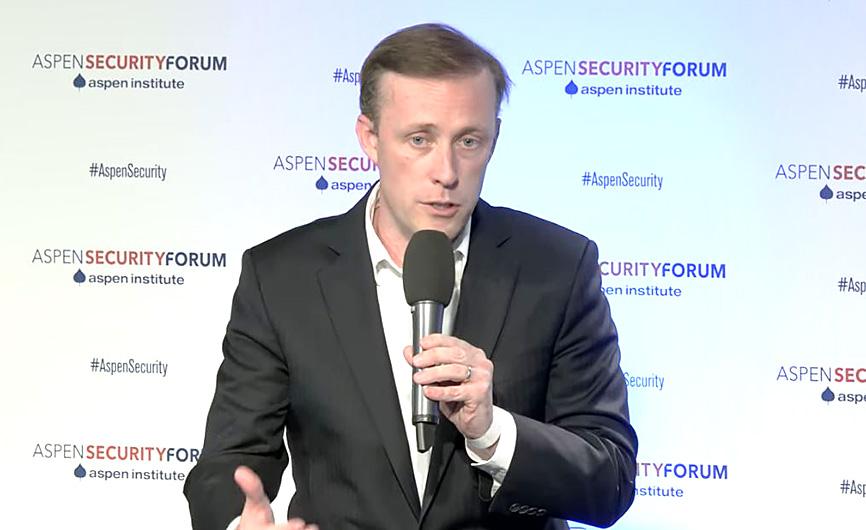The US’ policy is to help Taiwan focus on obtaining the capabilities it needs the most to repel a possible Chinese attack and not the weapon systems it is accustomed to having, a senior US official said on Friday.
US National Security Adviser Jake Sullivan made the remark at the Aspen Security Forum in Colorado after being asked if US President Joe Biden’s “porcupine strategy” has prepared Taiwan to defend itself “right now.”
“We are focused on those capabilities that are going to be most useful in the kinds of contingency we can expect, and not just rely on systems that... [Taiwan has] had around for a very long time,” he said.

Photo: Screen grab from the forum’s video footage
Asked whether Russia’s war in Ukraine could drain the US’ supply of arms to Taiwan, Sullivan said that there are “some overlaps” in the weapons systems required by the two situations.
However, a major contrast exists between Taiwan and Ukraine due to “the nature of the contingency or conflict [being] quite different from [a] land war in Europe and a potential contingency or conflict across the Taiwan Strait,” he said.
Washington’s continued support of the two countries would require increased investment, workforce development and an emphasis on bolstering the supply of key components and weapon systems, he said.
The Ukraine war has not prompted Beijing to fundamentally rethink its approach to Taiwan, but it has learned some concerning lessons about invading another country, he said.
However, Taiwan is also “working rapidly” to learn about mobilization, territorial defense and information warfare from Ukraine, he said.
Asked whether Biden’s statement in May that the US would defend Taiwan represents a shift in Washington’s policy, Sullivan said: “The president said in Japan that our policy has not changed, that we maintain a policy of strategic ambiguity, and we do.”
“Ambiguity has to be a feature of strategy in certain contexts, particularly very complex concepts,” he said. “I will stand to defend that idea conceptually.”
The US’ stance on its relationship with Taiwan continues to governed by the one China policy,” the Three Joint Communiques, the “six assurances” and the Taiwan Relations Act, he said.
Regarding competition between the US and China, Sullivan said that the US has become “well-positioned” to deal with that challenge, as the Biden administration has taken measures to bolster alliances in the Indo-Pacific region, Europe and the Middle East.
“The last thing I would say on [Beijing] ... is, it is never a good bet to bet against the US,” he said.
“If you look at the headwinds China is facing from the point of view of economic challenges, its continued effort to deal with the zero-COVID policy, I think there are real questions about what exactly its trajectory is going forward,” he added.

DAREDEVIL: Honnold said it had always been a dream of his to climb Taipei 101, while a Netflix producer said the skyscraper was ‘a real icon of this country’ US climber Alex Honnold yesterday took on Taiwan’s tallest building, becoming the first person to scale Taipei 101 without a rope, harness or safety net. Hundreds of spectators gathered at the base of the 101-story skyscraper to watch Honnold, 40, embark on his daredevil feat, which was also broadcast live on Netflix. Dressed in a red T-shirt and yellow custom-made climbing shoes, Honnold swiftly moved up the southeast face of the glass and steel building. At one point, he stepped onto a platform midway up to wave down at fans and onlookers who were taking photos. People watching from inside

A Vietnamese migrant worker yesterday won NT$12 million (US$379,627) on a Lunar New Year scratch card in Kaohsiung as part of Taiwan Lottery Co’s (台灣彩券) “NT$12 Million Grand Fortune” (1200萬大吉利) game. The man was the first top-prize winner of the new game launched on Jan. 6 to mark the Lunar New Year. Three Vietnamese migrant workers visited a Taiwan Lottery shop on Xinyue Street in Kaohsiung’s Gangshan District (崗山), a store representative said. The player bought multiple tickets and, after winning nothing, held the final lottery ticket in one hand and rubbed the store’s statue of the Maitreya Buddha’s belly with the other,

Japan’s strategic alliance with the US would collapse if Tokyo were to turn away from a conflict in Taiwan, Japanese Prime Minister Sanae Takaichi said yesterday, but distanced herself from previous comments that suggested a possible military response in such an event. Takaichi expressed her latest views on a nationally broadcast TV program late on Monday, where an opposition party leader criticized her for igniting tensions with China with the earlier remarks. Ties between Japan and China have sunk to the worst level in years after Takaichi said in November that a hypothetical Chinese attack on Taiwan could bring about a Japanese

‘COMMITTED TO DETERRENCE’: Washington would stand by its allies, but it can only help as much as countries help themselves, Raymond Greene said The US is committed to deterrence in the first island chain, but it should not bear the burden alone, as “freedom is not free,” American Institute in Taiwan Director Raymond Greene said in a speech at the Institute for National Defense and Security Research’s “Strengthening Resilience: Defense as the Engine of Development” seminar in Taipei yesterday. In the speech, titled “Investing Together and a Secure and Prosperous Future,” Greene highlighted the contributions of US President Donald Trump’s administration to Taiwan’s defense efforts, including the establishment of supply chains for drones and autonomous systems, offers of security assistance and the expansion of